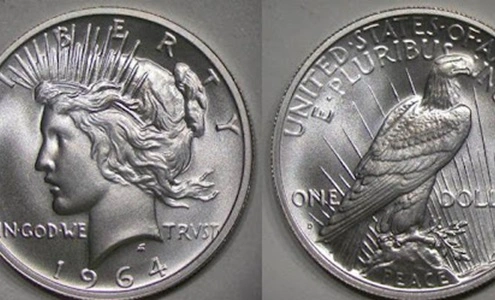Yes, it is illegal to own a 1964 Peace Dollar because none of these coins were legally released to the public, making them classified as government property. The story of the 1964 Peace Dollar is a fascinating tale of economic policy, political controversy, and legal implications that continue to spark intrigue among numismatists (coin collectors) and legal scholars alike.
What is the 1964 Peace Dollar?
The 1964 Peace Dollar was part of an effort to revive the iconic silver dollar series originally minted between 1921 and 1935. The Peace Dollar symbolized post-World War I peace, and its design remains one of the most celebrated in American coinage history.
In 1964, the U.S. Congress authorized the Denver Mint to strike 45 million new Peace Dollars to meet a perceived shortage of silver dollars in circulation. These coins were minted using 90% silver, a rarity as the country was transitioning away from silver coinage due to rising silver prices and economic shifts.
Why Were They Never Released?
Despite the initial minting, the 1964 Peace Dollar never officially entered circulation. Several factors contributed to this decision:
1. Economic and Political Backlash:
The minting of these coins coincided with growing concerns over silver shortages. Critics argued that producing silver dollars would exacerbate the issue, driving up silver prices and potentially destabilizing the market. This led to a political outcry against their release.
2. Transition to Clad Coinage:
In the mid-1960s, the U.S. government began phasing out silver coinage in favor of cheaper, copper-nickel clad coins. Issuing a new silver dollar clashed with the broader economic policy of reducing silver content in circulating coins.
3. Order for Destruction:
After minting approximately 316,076 coins at the Denver Mint, the U.S. government ordered all 1964 Peace Dollars to be melted down. Officials declared that none of these coins were ever officially released, and all known examples were destroyed.
Why Is It Illegal to Own One?
The key reason for the illegality of owning a 1964 Peace Dollar lies in its status as unauthorized property of the U.S. government. The U.S. Treasury and the Secret Service have maintained that any surviving 1964 Peace Dollars are considered stolen property. Here’s why:
1. No Legal Release:
Since the coins were never authorized for public distribution, they remain the property of the U.S. government. Even if a coin were to surface in private hands, it would be deemed improperly obtained.
2. Legal Precedent:
The U.S. government has consistently reclaimed coins deemed unauthorized releases. A similar example involves the 1933 Saint-Gaudens Double Eagle, where surviving coins were seized and legal battles ensued over ownership.
3. Strict Enforcement:
The Secret Service is tasked with enforcing laws related to counterfeit and unauthorized U.S. currency. They actively pursue and confiscate any reported instances of 1964 Peace Dollars.
Do Any Survive Today?
While the government maintains that all 1964 Peace Dollars were destroyed, rumors persist in numismatic circles about the existence of a few surviving specimens. Claims of these coins surfacing in private collections or auctions have never been substantiated, as any confirmed specimen would likely be seized by the government.
Recent Updates and Trends
As of 2024, there has been no change in the legal status of the 1964 Peace Dollar. Numismatic enthusiasts and historians continue to speculate about the possibility of surviving examples. However, experts advise caution against purchasing or attempting to trade these coins due to their illegal status and potential legal repercussions.
FAQs About the 1964 Peace Dollar
Q1. Is it illegal to buy or sell a 1964 Peace Dollar?
Ans: Yes, owning, buying, or selling a 1964 Peace Dollar is illegal because the coins are considered government property and were never officially released.
Q2. What happens if someone is found with a 1964 Peace Dollar?
Ans: The coin would be confiscated by the Secret Service, and the individual could face legal consequences, including potential fines or charges related to possessing stolen government property.
Q3. Why do people believe some 1964 Peace Dollars survived?
Ans: Speculation arises from rumors that a few coins escaped destruction. However, there is no verified evidence to support these claims.
Q4. Are there other coins with similar legal issues?
Ans: Yes, the 1933 Saint-Gaudens Double Eagle is another example. These coins were never officially released, and surviving specimens have been subject to legal battles and government seizure.
Q5. Can the 1964 Peace Dollar ever be made legal?
Ans: The U.S. government would need to authorize a special release or reissue, but such actions are highly unlikely given past policies and the legal precedent surrounding unauthorized coins.

